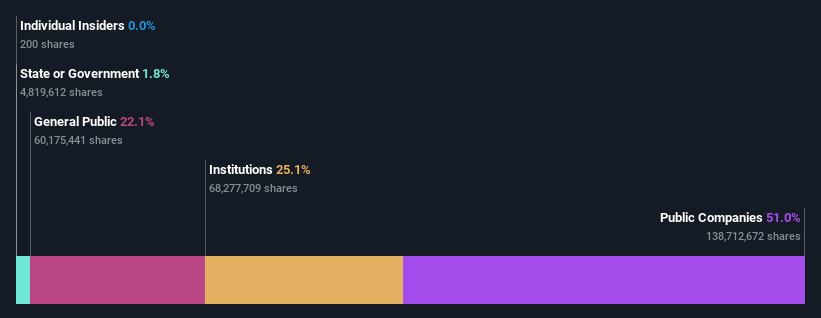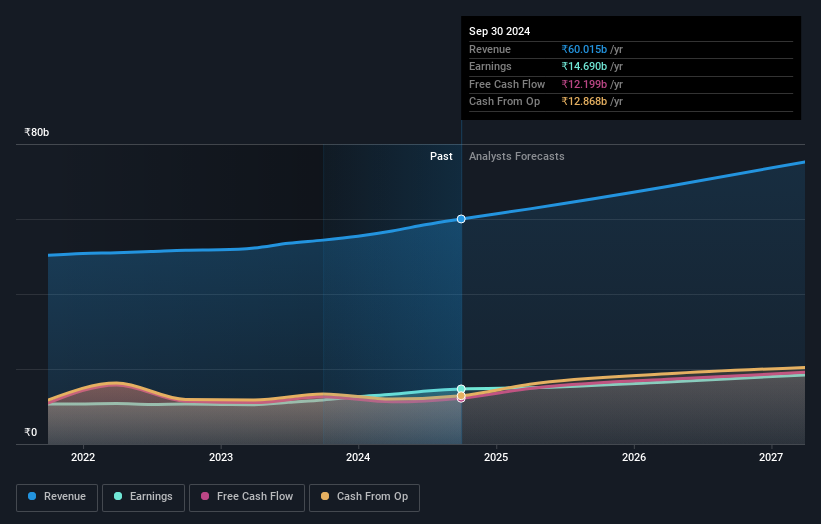- India
- /
- Personal Products
- /
- NSEI:COLPAL
Both public companies who control a good portion of Colgate-Palmolive (India) Limited (NSE:COLPAL) along with institutions must be dismayed after last week's 3.4% decrease
Key Insights
- Significant control over Colgate-Palmolive (India) by public companies implies that the general public has more power to influence management and governance-related decisions
- 51% of the company is held by a single shareholder (Colgate-Palmolive Company)
- 25% of Colgate-Palmolive (India) is held by Institutions
A look at the shareholders of Colgate-Palmolive (India) Limited (NSE:COLPAL) can tell us which group is most powerful. With 51% stake, public companies possess the maximum shares in the company. In other words, the group stands to gain the most (or lose the most) from their investment into the company.
While institutions, who own 25% shares weren’t spared from last week’s ₹28b market cap drop, public companies as a group suffered the maximum losses
In the chart below, we zoom in on the different ownership groups of Colgate-Palmolive (India).
Check out our latest analysis for Colgate-Palmolive (India)

What Does The Institutional Ownership Tell Us About Colgate-Palmolive (India)?
Institutions typically measure themselves against a benchmark when reporting to their own investors, so they often become more enthusiastic about a stock once it's included in a major index. We would expect most companies to have some institutions on the register, especially if they are growing.
Colgate-Palmolive (India) already has institutions on the share registry. Indeed, they own a respectable stake in the company. This can indicate that the company has a certain degree of credibility in the investment community. However, it is best to be wary of relying on the supposed validation that comes with institutional investors. They too, get it wrong sometimes. If multiple institutions change their view on a stock at the same time, you could see the share price drop fast. It's therefore worth looking at Colgate-Palmolive (India)'s earnings history below. Of course, the future is what really matters.

Hedge funds don't have many shares in Colgate-Palmolive (India). Our data shows that Colgate-Palmolive Company is the largest shareholder with 51% of shares outstanding. This implies that they have majority interest control of the future of the company. With 5.0% and 2.4% of the shares outstanding respectively, Mitsubishi UFJ Asset Management Co., Ltd. and First Sentier Investors (Australia) IM Ltd are the second and third largest shareholders.
While studying institutional ownership for a company can add value to your research, it is also a good practice to research analyst recommendations to get a deeper understand of a stock's expected performance. There are a reasonable number of analysts covering the stock, so it might be useful to find out their aggregate view on the future.
Insider Ownership Of Colgate-Palmolive (India)
The definition of an insider can differ slightly between different countries, but members of the board of directors always count. Company management run the business, but the CEO will answer to the board, even if he or she is a member of it.
I generally consider insider ownership to be a good thing. However, on some occasions it makes it more difficult for other shareholders to hold the board accountable for decisions.
Our data suggests that insiders own under 1% of Colgate-Palmolive (India) Limited in their own names. It is a very large company, so it would be surprising to see insiders own a large proportion of the company. Though their holding amounts to less than 1%, we can see that board members collectively own ₹582k worth of shares (at current prices). It is good to see board members owning shares, but it might be worth checking if those insiders have been buying.
General Public Ownership
The general public, who are usually individual investors, hold a 22% stake in Colgate-Palmolive (India). While this group can't necessarily call the shots, it can certainly have a real influence on how the company is run.
Public Company Ownership
Public companies currently own 51% of Colgate-Palmolive (India) stock. It's hard to say for sure but this suggests they have entwined business interests. This might be a strategic stake, so it's worth watching this space for changes in ownership.
Next Steps:
I find it very interesting to look at who exactly owns a company. But to truly gain insight, we need to consider other information, too. Be aware that Colgate-Palmolive (India) is showing 2 warning signs in our investment analysis , you should know about...
Ultimately the future is most important. You can access this free report on analyst forecasts for the company.
NB: Figures in this article are calculated using data from the last twelve months, which refer to the 12-month period ending on the last date of the month the financial statement is dated. This may not be consistent with full year annual report figures.
New: AI Stock Screener & Alerts
Our new AI Stock Screener scans the market every day to uncover opportunities.
• Dividend Powerhouses (3%+ Yield)
• Undervalued Small Caps with Insider Buying
• High growth Tech and AI Companies
Or build your own from over 50 metrics.
Have feedback on this article? Concerned about the content? Get in touch with us directly. Alternatively, email editorial-team (at) simplywallst.com.
This article by Simply Wall St is general in nature. We provide commentary based on historical data and analyst forecasts only using an unbiased methodology and our articles are not intended to be financial advice. It does not constitute a recommendation to buy or sell any stock, and does not take account of your objectives, or your financial situation. We aim to bring you long-term focused analysis driven by fundamental data. Note that our analysis may not factor in the latest price-sensitive company announcements or qualitative material. Simply Wall St has no position in any stocks mentioned.
About NSEI:COLPAL
Colgate-Palmolive (India)
Manufactures and trades in personal and oral care products in India.
Flawless balance sheet with acceptable track record.
Market Insights
Community Narratives




